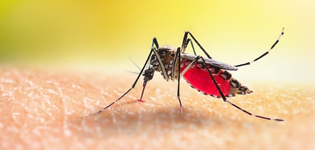
Malaria

Malaria is a potentially fatal mosquito-borne disease caused by a parasite. In India, malaria is primarily caused by the parasitic species Plasmodium falciparum and Plasmodium vivax. When an infected mosquito bites, symptoms appear after 10-14 days for P. falciparum or 2-3 weeks for P. vivax (3-6 months for some strains).
Symptoms
Uncomplicated malaria
- Fever
- Moderate-to-severe chills
- Profuse sweating
- Headache
- Cough
- Diarrhoea
- Body-aches
- Nausea/vomiting
- Anaemia
Severe malaria
- Prostration
- Respiratory distress
- Confusion/agitation
- Convulsion
- Shock
- Coma
- Abnormal bleeding
- Repeated vomiting
Transmission
The malarial parasite is transmitted to humans through the bite of an infected female mosquito of the genus Anopheles.
Prevention
- Malaria can be prevented by chemoprophylaxis (use of drugs), vaccination, bite-avoidance and vector-control measures
- The only WHO approved vaccine for malaria is called RTS,S/AS01 (RTS,S)
- The vaccine is recommended for infants and children: 3 doses are to be given intramuscularly between 5 and 17 months, with a fourth booster dose at ~2 years
Incidence
- In the last 10 years, India has shown great progress in malaria control.
- Total malaria cases declined by 42%, from 1.92 million in 2004 to 1.1 million in 2014
- Malaria-related deaths have similarly declined by 40.8% from 949 in 2004 to 562 in 2014
References
- Ashley EA, Pyae Phyo A, Woodrow CJ. Malaria. Lancet. 2018;391(10130):1608-1621.
- Phillips MA, Burrows JN, Manyando C, van Huijsduijnen RH, Van Voorhis WC, Wells TNC. Malaria. Nat Rev Dis Primers. 2017;3:17050.
- Keating GM. RTS,S/AS01 malaria vaccine (Mosquirix™): a guide to its use. Drugs Ther Perspect. 2016;32:143-148.
- National framework for malaria elimination in India (2016-2030). Ministry of health & family welfare. Government of India. Available at: https://www.who.int/docs/default-source/searo/india/health-topic-pdf/national-framework-malaria-elimination-india-2016-2030.pdf?sfvrsn=606b352a_2. Accessed 10th February, 2023.